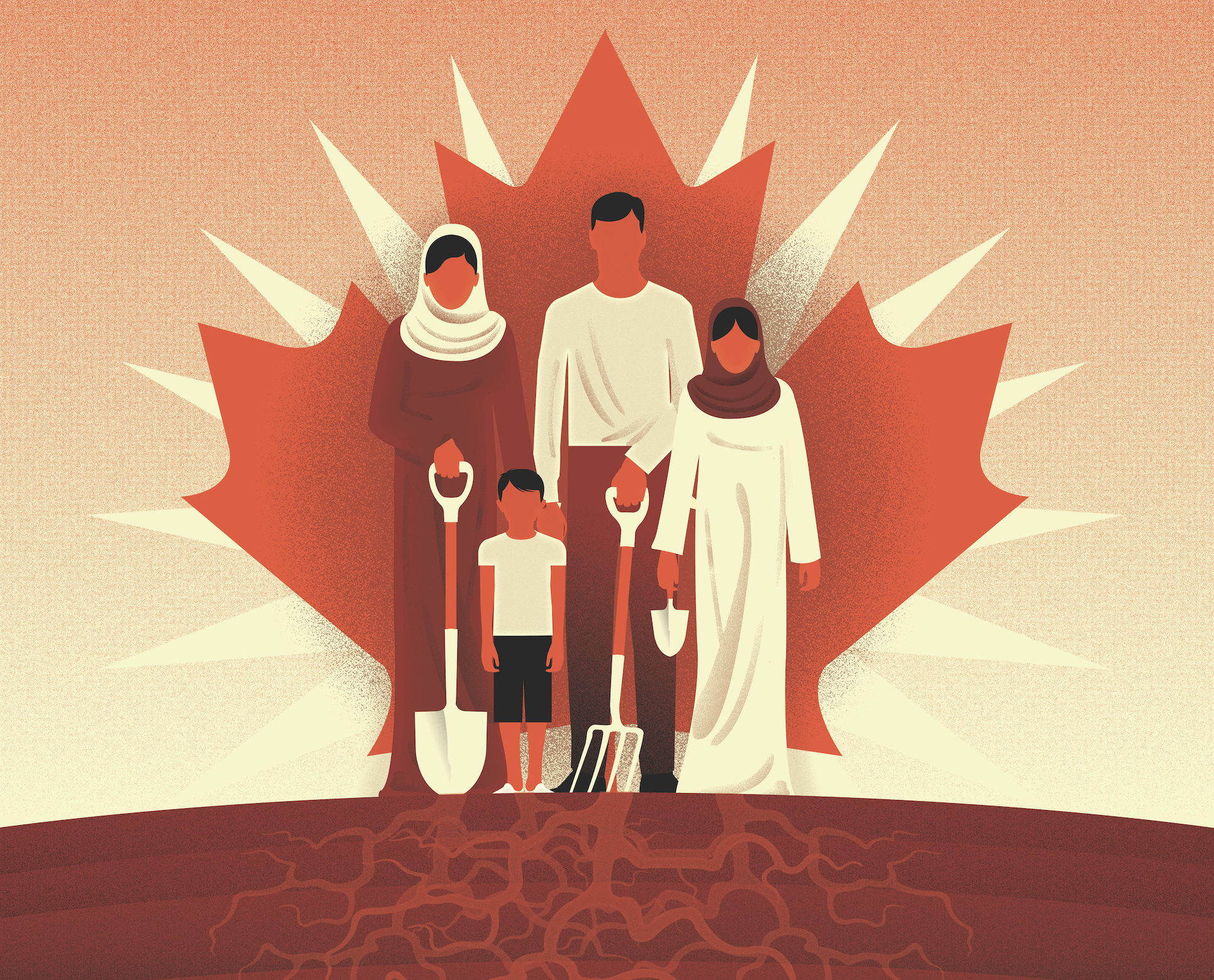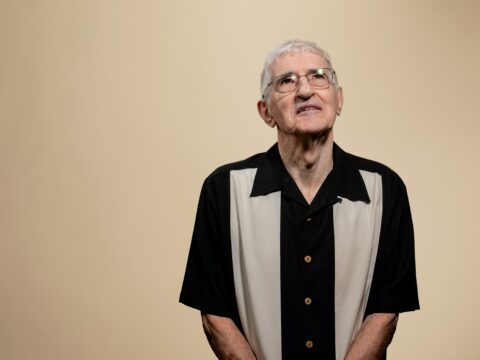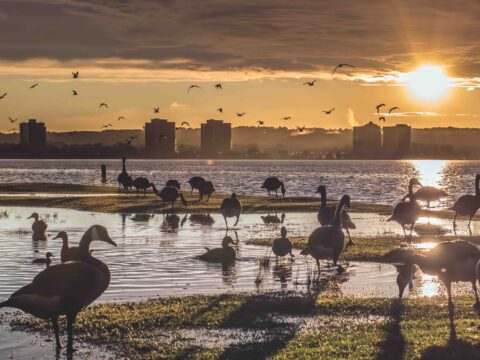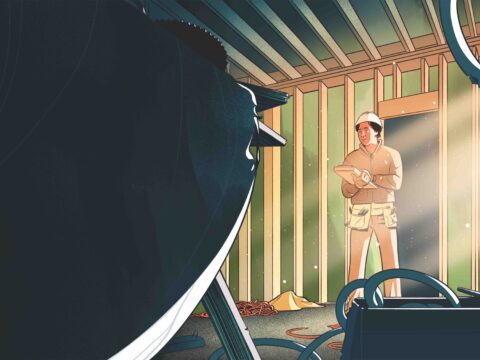Nafiya Naso pulls her van off the road, through some trees and onto a gravelled private path, and it feels like we’re leaving one world behind for another. The noise of the highway is replaced by the sounds of children laughing, adults quietly chatting and the hum of an irrigation pump and large sprinklers. It’s early August, and we’re surrounded by almost three hectares of rich farmland, filled with potatoes, onions, kale, zucchini and more.
This small farm just outside Winnipeg, donated by a landscape architect and United Church member, is run by 42 Yazidi families with the support of numerous local organizations of different faiths. It’s an experiment, of sorts. And it’s succeeding.
You can’t tell by looking, but most of the people here have experienced significant trauma and hardship. They are Yazidi refugees, brought to Canada by the federal government or through private sponsorship, and they have been through hell.
The Yazidi people, a religious and ethnic minority who live primarily in northeastern Iraq, have long been persecuted for their beliefs. They are a people who keep to themselves and marry within the community, remaining unknown even to those who live nearby. Their religion is monotheistic but distinct from the world’s major faiths; an important figure is the Peacock Angel. Outsiders have mistaken him for Satan, even though the religion does not include the devil at all. This misunderstanding is, in fact, the reason for much of their persecution.
Most recently, ISIS declared them to be devil worshippers and drove them from their ancestral homeland in 2014, systematically hunting down and murdering Yazidis by the thousands. Still thousands more, particularly women and children, were taken as prisoners and used as sex slaves or trained to be fighters and suicide bombers. Countless Yazidi women have died by suicide, due to the extreme trauma they endured.
Watch: Refugees talk about what the project means to them
The Canadian government agreed in 2017 to resettle 1,200 Yazidi refugees, and many more have gone to Germany, Belgium, Australia and elsewhere. Today, there’s a growing Yazidi population in Winnipeg, thanks in large part to Operation Ezra, an initiative that began in 2015 to privately sponsor refugees and help all Yazidis adjust to life in the city. It started within the Jewish community, where its leadership remains, though it quickly grew into a much bigger interfaith collaboration. The organization has raised more than $700,000 so far, and regularly holds food and clothing drives with the help of its many interfaith partners.
That was how Winnipeg’s Charleswood United got involved in fall 2018. “We held [a] food drive in September,” says Rev. Michael Wilson, “and the congregation responded generously.” Just a few months later, congregant Bo Wohlers approached Wilson with an idea.
He had read a newspaper article about an Operation Ezra initiative in Portage la Prairie, Man., an hour’s drive from Winnipeg. There, Yazidi refugees were harvesting potatoes to feed their families and others in the community. Wohlers started to think about his own company’s property. “We have very good farmland 20 minutes outside the city,” he says. “We had a nursery there, but we got flooded out several years ago. Since then, the lands were sitting idle.” He decided what he had could benefit others more than himself.
“Being an immigrant myself, I know how hard it is, especially the first few years, to get settled in a country,” says Wohlers, who came here from Germany in 1972. “I really felt for the people because they went through some tremendous hardships through ISIS and the war.” Wilson connected Wohlers with Operation Ezra, and the project was soon underway.
When Wohlers showed a group of refugees the land they’d be working on, the first thing the Yazidis did was take some of the soil in their hands and sniff. Wohlers explains that anyone with a farming background does this, because the soil’s smell can indicate its fertility. “They said, ‘Oh, this is really good soil. We’ll be happy here.’”
The Yazidis are primarily farming people. Before they were forced out by ISIS, they tended the fertile land of their relatively temperate home in northern Iraq, growing eggplants, tomatoes, zucchini and potatoes. Now, they’re bringing that same care to this piece of farmland on the other side of the world.
Children run through the crops, looking for ripe zucchini to pick and bring back to their parents. They point at green tomatoes with pride and creep through winding vines to inspect a growing pumpkin. One girl tells me excitedly about a birthday party she’s attending later. She’s going into Grade 1, loves her school and already speaks more English than her mother.
More on Broadview: Refugees shouldn’t have to pay to get to Canada
Nafiya Naso says that many of the children are adapting well to life in Canada, translating for their families and attending school. Naso, herself a Yazidi refugee whose family was sponsored nearly 20 years ago, is the resettlement co-ordinator for Operation Ezra. Her role is to help the Yazidis with the minutiae of adjusting to life in Canada: applying for health cards, registering the children in school, signing the adults up for English classes, explaining the banking system. “They didn’t have bank accounts or even mail back in Iraq, so it’s a huge adjustment,” she says.
Some of the other children face greater challenges, as they deal with the trauma of having been held captive by ISIS. “What makes [Yazidis] significantly different from many of the previous refugee arrivals,” notes a 2018 government report, “is the degree of physical, mental and emotional health issues, exacerbated by the fact that they are among the most marginalized and tormented ethnic minorities on the planet.” The report lays out some of what Yazidi children experienced: they watched members of ISIS murder their siblings, and were trained to become soldiers and suicide bombers. Many lost their native language because they were forced to speak Arabic from such a young age.
Naso is optimistic that the farm can play a role in their recovery. “I’ve watched these families on a daily basis, and they are different human beings when they’re at the farm,” she says. Some of the women, who are physically and psychologically distressed from their time being held captive, just kneel down in the soil and weed for hours without saying anything. “They know what needs to be done when they’re here.”
It’s a sentiment that all the Yazidis I spoke to at the farm echo. “I’m comfortable at the farm,” says Manal Al Hussein, a young mother with her gurgling five-month-old son, Bilsan, in tow. “It feels like home.” She describes how challenging the transition to life in Canada was for her. She lived in refugee camps in Iraq for three years before the Canadian government stepped in to bring her and her husband to Winnipeg while she was pregnant. When she arrived, she struggled to learn how to bank or take public transit. “Some things are difficult, some easy, but now it’s getting much better,” she says.
“I’ve watched these families on a daily basis, and they are different human beings when they’re at the farm.”
Al Hussein misses the rest of her family, however. The government didn’t approve her parents or siblings for refugee status, and she speaks openly about wanting to go back and visit.
After my visit to the farm, she returned with her husband to be reunited with her family in Iraq, where she has decided to remain.
Other Yazidis are using the farm to help settle in to life in Winnipeg, with a goal of self-sufficiency. They want to be able to support themselves instead of relying on the government or community indefinitely, and building a resumé from scratch to find employment in a new country is no easy task. While no one is paying them for this work, the farming initiative has successfully fed the 42 Yazidi families involved in the project. Anything they couldn’t eat was sold at farmers markets in the Winnipeg area, including at Charleswood United and at Wohlers’ garden centre, making thousands of dollars that they are now reinvesting into this year’s farm supplies. They donated the leftovers to local food banks.
A small group of six Yazidi men and women already met with Wohlers in the fall to plan this year’s crop. Although Wohlers donated seeds, fertilizer, land and expertise in the first year, the goal is for the Yazidi families to gradually become more independent as farmers. For several of them, this is a full-time job; for others, this is a place they come to help out and to heal. The roots the Yazidis are growing in Winnipeg are both literal and figurative.
This story first appeared in Broadview‘s March 2020 issue with the title “Putting down roots.”
Broadview is an award-winning progressive Christian magazine, featuring stories about spirituality, justice and ethical living. For more of our content, subscribe to the magazine today.
















beautiful ministry. more denominations need to partner with newcomers to Canada
Such an inspirational article. As I was once an immigrant myself. I can relate to many adjustment issues but the Yazidis’ circumstances and needs are way beyond mine. Such courage and strength they have! The helpers are blessed blessings. Haw’aa.
SO great. Love the United Church and all the big hearts and souls like the Wohlers.
Get canning jars and preserve EVERYTHING including potatoes.